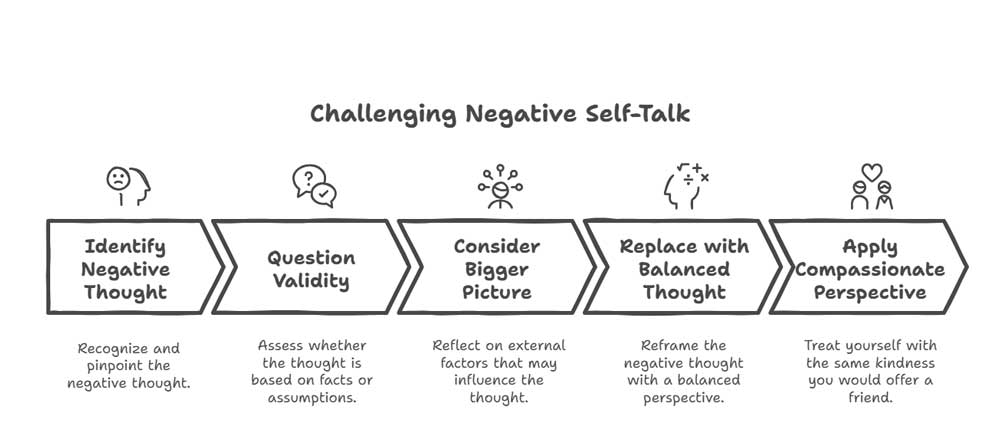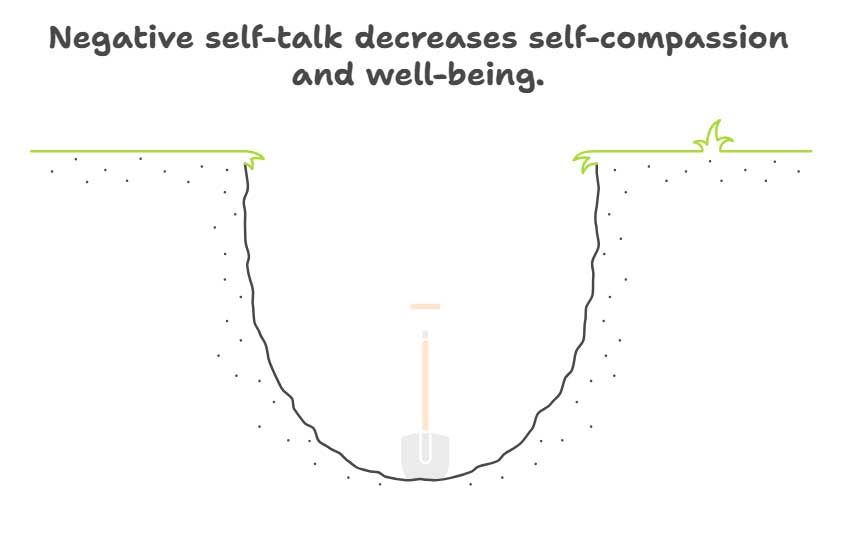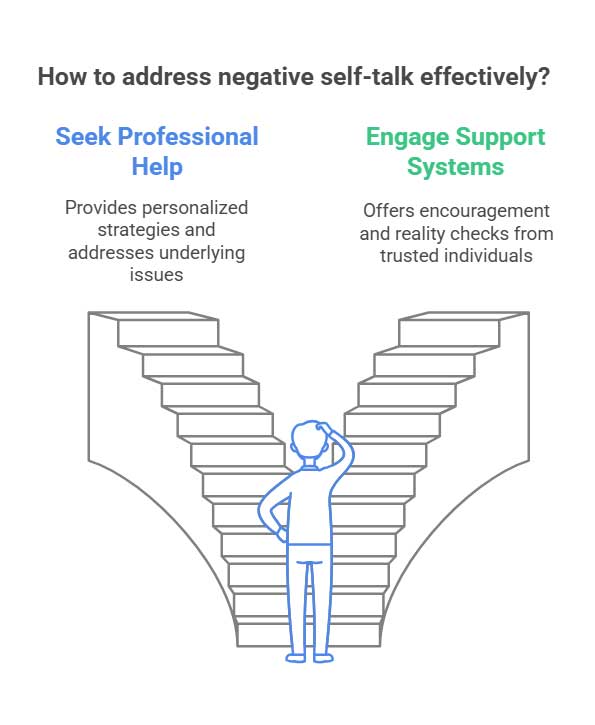Introduction: Understanding the Impact of Negative Self-Talk
What is Negative Self-Talk?
That little voice inside your head—sometimes it cheers you on, but other times, it’s your harshest critic. Negative self-talk is the pattern of internal dialogue that undermines your confidence, magnifies mistakes, and makes challenges feel insurmountable. Whether it’s calling yourself a failure after a minor setback or convincing yourself you’ll never be good enough, these thoughts can have a significant impact on mental well-being.
Why Negative Self-Talk is Harmful
Unchecked, negative self-talk fuels anxiety, lowers self-esteem, and can even contribute to depression. It affects not just how you see yourself but also how you navigate relationships, work, and personal goals. The good news? This cycle isn’t set in stone.
Overcoming negative self-talk starts with awareness and intentional change. This blog will guide you through key strategies such as recognizing and challenging these thoughts, practicing positive affirmations, using mindfulness techniques, and creating a supportive environment to cultivate a healthier mindset.
Step 1: Recognize Negative Self-Talk
Before you can change negative self-talk, you need to identify it. These thoughts often disguise themselves as truths when, in reality, they are distortions of reality.
Common Forms of Negative Self-Talk:
- Self-Criticism – “I’m not good enough.”
- Catastrophizing – “If I mess this up, everything will fall apart.”
- Personalization – “They didn’t text back because they’re mad at me.”
- All-or-Nothing Thinking – “If I don’t succeed, I’m a complete failure.”
Many people don’t even realize they engage in negative self-talk because it becomes so automatic. That’s why self-awareness is the first step in breaking the cycle.
How to Identify Negative Self-Talk:
- Journaling – Write down your thoughts when you’re feeling discouraged or anxious. Look for patterns in your inner dialogue.
- Check Your Mood – Negative self-talk often correlates with low energy, stress, or irritability.
- Pause and Reflect – When you catch a negative thought, ask yourself: Would I say this to a friend?
By tuning into these thoughts and recognizing their impact, you take the first step toward shifting your mindset. In the next section, we’ll explore how to challenge and reframe these thoughts to create a more constructive inner dialogue.
Step 2: Challenge Negative Self-Talk
Once you’ve recognized when you’re engaging in negative self-talk, the next crucial step is to challenge those thoughts. Negative self-talk is often distorted, not based on facts, and exaggerated in a way that affects how you perceive yourself and the world around you. By questioning the accuracy and validity of these thoughts, you can begin to change the way you think about yourself.
How to Question Negative Thoughts?
The process of challenging negative thoughts involves asking yourself key questions to uncover their truth. Consider the following steps:
- Identify the Thought: Start by becoming aware of the specific negative thought. For example, you might think, “I’m a failure.”
- Question Its Validity: Ask yourself whether the thought is based on facts or assumptions. Is there evidence that supports this belief? Think about the times when you succeeded or handled challenges well. Is the negative thought an overgeneralization of a single experience?
- Consider the Bigger Picture: Reflect on other factors that might be influencing your thoughts. For instance, are you feeling stressed or tired, which may make negative thoughts seem more pronounced? This can help you see the thought in a more balanced light.
- Replace with a Balanced Thought: Once you’ve challenged the negative thought, reframe it with something more balanced or positive. For instance, change “I’m a failure” to “I made a mistake, but I can learn from it.” This shift encourages growth and learning rather than self-blame.
- Ask Yourself: What Would I Tell a Friend? Often, we’re kinder and more understanding when offering advice to others than we are with ourselves. Think about how you would support a friend who had similar thoughts, and apply that same level of compassion and logic to yourself.
Practical Examples of Reframing Negative Self-Talk
- Negative Thought: “I’m not good enough to achieve my goals.”
- Reframed Thought: “I may face challenges, but I can work through them, and I can improve with effort and practice.”
- Negative Thought: “I always mess things up.”
- Reframed Thought: “I’ve made mistakes, but that’s part of learning. I can take this experience and use it to do better next time.”
- Negative Thought: “Nobody likes me.”
- Reframed Thought: “I may not connect with everyone, but I have people in my life who care about me, and I can continue to build meaningful relationships.”
By challenging and reframing negative self-talk in this way, you can begin to shift your mindset from one of self-criticism to one of self-compassion and growth. This change in perspective allows you to handle difficulties with more resilience and promotes a healthier relationship with yourself.

Step 3: Practice Positive Self-Talk
Once you’ve identified negative self-talk, the next step is to replace it with positive self-talk. This shift isn’t about ignoring your flaws or pretending everything is perfect—it’s about balancing out your inner dialogue and fostering a healthier mindset.
The Role of Positive Affirmations
Positive affirmations are simple, empowering statements that help reframe negative thoughts and reinforce a positive self-image. By repeating these affirmations, you can gradually change the way you think about yourself and your abilities. Think of affirmations as a way to “rewire” your brain, building confidence and promoting a growth mindset.
For example, instead of thinking, “I’m terrible at this,” try affirming, “I am capable of learning and improving with practice.” This subtle shift can make a big difference in how you approach challenges and setbacks.
Practical Examples of Affirmations
- “I am worthy of success and happiness.”
- “I have the strength to face any challenge.”
- “Every mistake is an opportunity to learn and grow.”
- “I am enough just as I am.”
To use affirmations effectively:
- Repeat them daily – Set aside a few minutes in the morning or evening to say them out loud or write them down.
- Make them personal – Tailor affirmations to reflect what you need most. For example, if you struggle with confidence, focus on affirmations related to self-worth.
- Visualize while affirming – As you repeat the affirmation, picture yourself embodying the qualities you’re affirming.
Addressing Skepticism: The Power of Repetition and Belief
It’s common to feel skeptical about affirmations, especially if they seem too “feel-good” or unrealistic. The truth is, that the effectiveness of affirmations lies in repetition and belief. Over time, they help shift your subconscious mind by replacing old, negative thought patterns with new, positive ones. The more consistently you practice them, the more you believe in your potential. It may feel awkward at first, but persistence pays off.
Step 4: Step Outside of Yourself
It’s easy to get trapped in the cycle of negative self-talk, especially when you’re overwhelmed or frustrated. But one of the most effective ways to break this cycle is to step outside of yourself and adopt an external perspective.
How to Offer Yourself the Same Compassion You Would a Friend?
Imagine a close friend came to you with the same negative thoughts you’re having about yourself. What would you say to them? This simple exercise helps shift your mindset from self-criticism to self-compassion. You’d likely tell your friend they’re not a failure, that everyone makes mistakes, and that they have the ability to improve. So why not extend the same kindness to yourself?
Self-Compassion: Treat Yourself with Kindness
Self-compassion means treating yourself with the same care and understanding you would offer a loved one. It’s about recognizing that, as a human being, you’re bound to make mistakes and face setbacks—and that’s okay. Instead of punishing yourself with harsh criticism, offer yourself patience, support, and understanding.
Simple Exercises for Practicing Self-Kindness
- The “Friend” Exercise – When you catch yourself in negative self-talk, pause and ask: Would I say this to a friend? If not, reframe the thought in a more compassionate way.
- Self-Compassionate Letter – Write a letter to yourself from the perspective of a caring friend. Offer words of comfort, encouragement, and understanding.
- Gentle Reminders – Create a list of positive qualities about yourself and refer to it when you’re feeling down. Remind yourself of your strengths and the progress you’ve made.
By stepping outside of yourself and treating yourself with the same compassion you’d offer a friend, you not only reduce negative self-talk but also nurture a healthier, kinder relationship with yourself.

Step 5: Engage in Mindfulness and Meditation
Mindfulness is a powerful tool in the fight against negative self-talk. It’s about learning to observe your thoughts without getting caught up in them. Rather than reacting automatically to negative thoughts, mindfulness encourages you to notice them, let them pass, and gently guide your attention back to the present moment.
The Benefits of Mindfulness in Overcoming Negative Self-Talk
When you’re mindful, you stop identifying with every thought that crosses your mind. Instead of automatically believing that negative thoughts are truths, mindfulness allows you to acknowledge them as mere thoughts—temporary and often distorted. For instance, if you think, “I’m terrible at this,” mindfulness helps you step back and recognize, “That’s just a thought I’m having, not a fact about who I am.” By observing your thoughts in this way, you reduce their emotional power and distance yourself from their negative impact.
How Meditation Can Help Detach from Negative Self-Talk
Meditation is an extension of mindfulness. It’s a practice that helps you train your mind to focus on the present moment and detach from the constant stream of thoughts that can lead to negativity. By dedicating a few minutes each day to meditation, you learn to quiet the mental chatter and create a mental space where you’re less likely to engage in self-critical thinking. Over time, this practice builds resilience, helping you stay centered even when negative thoughts arise.
Beginner-Friendly Mindfulness Exercises
- Breathing Exercise: Find a quiet space and sit comfortably. Focus all of your attention on your breath. Inhale deeply for a count of four, hold for a count of four, and exhale slowly for a count of four. If your mind drifts, gently guide it back to your breath.
- Body Scan Meditation: Close your eyes and slowly bring your awareness to each part of your body, starting from your toes and working your way up to your head. Pay attention to any areas of tension and consciously relax them.
- Mindful Walking: Take a slow walk, paying attention to each step you take. Notice the feeling of your feet on the ground, the sounds around you, and the rhythm of your movement.
Mindfulness and meditation are simple but effective ways to break the cycle of negative self-talk and cultivate a calmer, more balanced mindset.
Step 6: Celebrate Your Wins
It’s easy to overlook your achievements when you’re focused on what’s going wrong or what’s yet to be done. However, celebrating your successes, both big and small, is crucial for building self-confidence and reinforcing positive self-talk.
The Importance of Acknowledging Achievements
When we don’t take time to acknowledge our accomplishments, we miss out on valuable opportunities to reinforce our worth and capabilities. Whether it’s finishing a work project, making it through a tough day, or simply getting out of bed when you’re feeling low, every victory counts. Recognizing your progress reminds you that you’re capable of growth and success, even when things aren’t perfect.
How to Keep a “Win Journal”
One effective way to celebrate your wins is by keeping a “win journal.” At the end of each day or week, write down at least three things you accomplished or moments you’re proud of. These can be anything from small wins (e.g., taking a walk, reaching out to a friend) to bigger milestones (e.g., completing a difficult task, overcoming a fear). Over time, this journal serves as a tangible reminder of your strengths and successes, which can be incredibly powerful when negative self-talk tries to creep in.
Setting Reminders to Recognize Personal Growth
If journaling isn’t your thing, set up small reminders throughout your day to recognize personal growth. It could be as simple as a sticky note on your desk with the word “progress” or a phone reminder to pause and reflect on your achievements. These reminders act as little moments of recognition, reinforcing the idea that you are moving forward, even if it doesn’t always feel like it.
Celebrating your wins isn’t just about boosting your confidence in the moment—it also shifts your focus toward growth and progress. By recognizing your accomplishments regularly, you cultivate a positive mindset that makes it easier to break free from negative self-talk.

Step 7: Seek Support
While self-awareness and personal techniques can significantly help in overcoming negative self-talk, there are times when external support is crucial—especially when these thoughts are persistent or affecting your ability to function in daily life.
When Negative Self-Talk Requires External Help
If negative self-talk is leading to chronic feelings of low self-worth, anxiety, depression, or even affecting relationships and work performance, it’s time to seek professional support. Therapy or counseling can provide you with personalized strategies to combat negative thoughts and help you address any underlying emotional or psychological issues. A trained therapist can guide you in exploring the root causes of negative self-talk and offer proven techniques like cognitive-behavioral therapy (CBT) to reframe these thoughts.
The Role of Support Systems
Support systems play a vital role in reinforcing positive self-talk. Trusted friends, family members, and colleagues can offer perspective, encouragement, and a much-needed reality check. Sometimes, just talking things through with someone can help you see that your thoughts are distorted and not a true reflection of who you are.
- Friends and Family: Those close to you can remind you of your strengths and provide a safe space for vulnerability. They can offer the kind of positive reinforcement and emotional support that’s difficult to provide on your own when caught in a cycle of negativity.
- Therapists and Counselors: Mental health professionals can help you develop tools to manage and reframe negative self-talk, guiding you through deeper emotional work when necessary.
Seeking support is a sign of strength, not weakness. It allows you to gain clarity, challenge negative beliefs, and create healthier patterns of thinking.

Step 8: Surround Yourself with Positivity
Your environment has a profound impact on your mental and emotional well-being. The people you spend time with and the content you consume can either uplift or reinforce negative self-talk. Surrounding yourself with positivity is one of the most powerful ways to shift your mindset and cultivate a healthier self-perception.
How Your Environment Affects Your Self-Talk
Your social circle plays a crucial role in shaping your self-esteem and confidence. People who are supportive, encouraging, and who model healthy self-talk can inspire you to do the same. On the other hand, being around individuals who are negative, judgmental, or critical can exacerbate your own self-doubt and internal criticism.
Consider the quality of your relationships—do the people around you help you grow, or do they drag you down? Aim to surround yourself with individuals who offer constructive feedback, celebrate your wins, and empower you to be your best self.
Engaging with People Who Uplift and Motivate
Seek out friends, mentors, or groups that foster positive energy. Spend time with those who encourage personal growth and who lift you up rather than contribute to your negative self-perceptions. Social support can be incredibly grounding, especially during times when your inner voice becomes overly critical.
Limit Exposure to Negativity
In addition to positive relationships, managing your exposure to negativity is key. This includes:
- Social Media: Social media can amplify feelings of inadequacy. Be mindful of how certain accounts or platforms make you feel, and consider curating your feed to reflect positivity, personal growth, and authentic content.
- Toxic Relationships: If someone in your life consistently undermines you or feeds into negative self-talk, consider setting boundaries or limiting your interactions with them.
- Harmful Content: Whether it’s media that fuels comparison or negative news that increases stress, be conscious of how external content impacts your mood. Protect your mental health by choosing what you consume with care.
By curating your environment and spending time with people who promote a positive, encouraging outlook, you help protect yourself from the influence of negative self-talk and cultivate a mindset of growth and resilience.
Step 9: Practice Gratitude
Shifting your mindset from negativity to appreciation is a powerful tool for combating negative self-talk. Gratitude has the unique ability to rewire your brain, helping you focus on the positives in your life rather than the things you lack or the mistakes you’ve made. This shift in focus not only improves your mood but also helps build resilience against self-criticism.
How Gratitude Can Shift Your Mindset
Gratitude encourages your brain to focus on what’s going well in your life, which in turn can reduce the intensity of negative thoughts. Studies have shown that practicing gratitude can activate areas of the brain associated with happiness and reward, while simultaneously decreasing activity in regions linked to stress and negativity. When you regularly take time to reflect on what you are grateful for, your brain becomes conditioned to notice the good, rather than fixating on the bad.
Keeping a Gratitude Journal
One of the most effective ways to incorporate gratitude into your life is through journaling. Each day, write down three things you’re grateful for. They can be as simple as a warm cup of coffee in the morning, a friendly conversation with a colleague, or even your ability to handle a challenging situation. The key is to focus on the positive moments of your day, no matter how small they may seem. Over time, your gratitude journal will become a tangible record of the good in your life, helping to counterbalance any negative self-talk that may arise.
Simple Gratitude Exercises
- Gratitude Jar: Write down something you’re thankful for on a small piece of paper each day and place it in a jar. On tough days, you can pull out a few notes to remind yourself of the good things in your life.
- Three Good Things: Before bed, think of three positive things that happened during the day. They don’t have to be big achievements—sometimes it’s the little moments that make the biggest difference.
- Gratitude Walk: While walking, think of things you’re thankful for. As you walk through your neighborhood or a nearby park, let your mind focus on the beauty around you or the support you have in your life.
Incorporating gratitude into your routine doesn’t require major changes—it’s about creating small, consistent practices that redirect your focus to appreciation rather than self-criticism.

Conclusion: Moving Forward with a Healthier Mindset
Overcoming negative self-talk is not something that happens overnight, but it is absolutely within your reach. By recognizing your negative thoughts, challenging them, and replacing them with healthier, more balanced perspectives, you can begin to reshape your internal dialogue. Whether it’s practicing positive self-talk, engaging in mindfulness, or seeking support from others, each of the strategies we’ve explored can help you create lasting change.
Remember, change takes time. It’s easy to fall back into old patterns, but by making small, consistent changes each day, you’ll gradually build a stronger, more compassionate relationship with yourself. Every step you take toward overcoming negative self-talk is a victory.
Try one of the techniques mentioned today, whether it’s journaling about a small win or practicing a positive affirmation. Reflect on how it makes you feel, and notice how the shift in focus impacts your mindset. Small actions add up to big changes over time, and with continued practice, you’ll be amazed at how much more empowered you can feel in your own skin.
Start today. Your journey to overcoming negative self-talk begins with one positive step!








